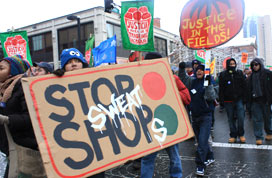 Over the past year, the $40 billion supermarket conglomerate Ahold (Dutch parent company of US-based chains Stop & Shop, Giant, Martin’s, and Peapod), has issued a steady stream ofcorporate responsibility reports, open letters, and public statements in an attempt to justify its decision to forgo participation in the CIW’s Fair Food Program. The program would require that Ahold agree to pay an extra penny per pound for the tomatoes it purchases, with that premium being passed on to the farmworkers who pick those tomatoes, and to purchase only from suppliers that adhere to a human rights-based code of conduct.
Over the past year, the $40 billion supermarket conglomerate Ahold (Dutch parent company of US-based chains Stop & Shop, Giant, Martin’s, and Peapod), has issued a steady stream ofcorporate responsibility reports, open letters, and public statements in an attempt to justify its decision to forgo participation in the CIW’s Fair Food Program. The program would require that Ahold agree to pay an extra penny per pound for the tomatoes it purchases, with that premium being passed on to the farmworkers who pick those tomatoes, and to purchase only from suppliers that adhere to a human rights-based code of conduct.
In an effort to defend its refusal to support the Fair Food Program, Ahold has offered up three basic rationales:
- Ahold claims that, according to its own internal audit, its Florida tomato suppliers meet its own Standards of Engagement. The results of this investigation thus guarantee that field workers in Ahold’s tomato supply chain are treated fairly and with dignity;
- While publicly praising last November’s breakthrough agreement between the CIW and the Florida Tomato Growers Exchange (FTGE), Ahold will not commit itself to the agreement’s benchmark standards nor will it pay the penny-per-pound price premium required by it. Instead, Ahold states that it will continue to pay a “fair market price” for its Florida tomatoes;
- Ahold claims that it “entered into a dialogue” with the CIW early in this process, implying that the course of action outlined in points (1) and (2) stems from a good-faith dialogue between the two parties.
Unfortunately for Florida farmworkers, Ahold’s unilateral approach stands in stark contrast to the promise of the Fair Food Program, a collaborative model of retailers advancing human rights in their supply chains, with their pennies and their purchases, that has been vetted and adopted by nine industry leaders – from the fast-food, foodservice and supermarket sectors – as well as by the FTGE.
Even the most casual analysis of the Ahold Standards of Engagement and the Fair Food Code of Conduct reveals striking and fundamental differences between the two approaches to supply chain accountability. In nearly all of its applicable provisions, the Ahold Standards of Engagement simply reaffirm compliance with existing legal norms and protections. The Fair Food Code of Conduct, on the other hand, establishes much higher standards that have been adopted through the direct partnership of buyers, growers and farmworkers themselves. This distinction is crucially important in the context of U.S. agriculture, where workers are excluded from the legal protections offered by the National Labor Relations Act and many sections of the Fair Labor Standards Act.
 There are also major red flags around issues of verification and enforcement. The Ahold Standards of Engagement have no clear enforcement powers or investigative mechanisms.
There are also major red flags around issues of verification and enforcement. The Ahold Standards of Engagement have no clear enforcement powers or investigative mechanisms.
What happens if a supplier is found to be out of compliance with the standards?
Who exactly will verify that Ahold follows through with its disciplinary procedures?
We’re simply left to take Ahold at its word. Under the Fair Food Code of Conduct, however, the taxonomy and consequences of code violations are clearly spelled out, as are the equally important mechanisms for independent, third-party verification and supply chain transparency.
All of which begs the question: How will Ahold even know if its suppliers are in or out of compliance with its own minimal standards?
The Florida tomato industry employs over 30,000 workers and cultivates over 30,000 acres across the state. Will Ahold dispatch its undisclosed and mysterious “internal team of experts” to Florida on a full-time basis to uncover human rights abuses in the fields? Or will Ahold sit back and wait for the occasional slavery prosecution or sexual harassment lawsuit to surface in newspaper headlines? Likewise, was Ahold “diligently monitoring” its tomato supply chain and “acting promptly and appropriately” when it continued, for months, to purchase tomatoes from at least one of the farms associated with a recent slavery prosecution? These questions are not rhetorical; they are essential to understanding the depth of Ahold’s commitment and the credibility of its approach.
The Fair Food Code of Conduct has been designed by farmworkers themselves, and its implementation and enforcement will likewise depend on ongoing farmworker participation. Under the Fair Food Code, workers play an indispensable role in promoting a safe and healthy workplace, maintaining their time records, and, when necessary, initiating a worker-triggered investigation process to uncover and address problems in the fields ranging from sexual harassment to verbally abusive supervisors. Workers are afforded no meaningful role in the Ahold Standards of Engagement, which is one of many reasons it will not improve conditions in Florida agriculture.
Finally, there are the issues of pay and price. The Fair Food Code of Conduct boosts farmworkers pay in two ways. Until now, it was standard practice for workers to have to overfill their buckets – which meant upwards of 10% of each worker’s labor was going unpaid. If they didn’t overfill the buckets, they would often not receive credit for the entire bucket. Now, farmworkers need only fill the bucket to the top in order for the bucket to be paid. Yet the Ahold Standards of Engagement are silent on this issue.
Likewise, the Fair Food Code of Conduct, through its penny-per-pound provision, has established a mechanism for retailers to improve farmworkers’ sub-poverty wages. To be clear, however, this does not require Ahold to enter into “direct wage negotiations” with farmworkers. As we have explained before:
“The penny-per-pound premium is, in fact, built into the final price, on the invoice, for the majority of retailers participating in the Fair Food program. The retailers simply pay for their tomatoes, as they always have, only now with a small premium, similar to any fair trade product. The accounting and distribution of the penny-per-pound funds are handled downstream in the supply chain. The workers are paid by the growers, in the form of a bonus in each check.”
Which brings us to Ahold’s claim of a being engaged in a sincere and ongoing dialogue with the CIW, a claim they repeated at this week’s shareholder meeting in Amsterdam. In short, we beg to differ, and since we are supposedly the other half of this “dialogue,” we are in a unique position to do so.Instead, Ahold has made clear that it simply wants to pay the straight market price. In reality, this means that Ahold will continue to use its high-volume, low-cost purchasing practices to demand ever lower prices for produce, creating ever stronger downward pressure on farmworkers’ wages and working conditions. In other words, Ahold’s Standards of Engagement simply offer more of the same when it comes to profiting from farmworkers’ exploitation. If Ahold truly supported social accountability within its tomato supply chain, it would make a real and binding commitment to the Fair Food Code of Conduct, including paying the penny-per-pound premium.
Here is the sum total of Ahold’s dialogue with us: We have met with Ahold exactly twice — once, briefly, in Amsterdam, and once for about an hour in New York. The essence of their participation can be boiled down to this:Thank you for traveling here to share your thoughts with us, but we are not interested. Their attorney has spoken by phone with the CIW’s attorney twice since then to reiterate that message. The last call was five months ago.
There is no ongoing dialogue.
In short, Ahold continues its policy of, in the words of the National Economic and Social Rights Initiative (NESRI), “dragging its feet on farmworker justice in its supply chain and attempting to co-opt the good name of a leading human rights organization, the Coalition of Immokalee Workers (CIW), to cover its tracks.”
 Yet none of this is news to Ahold. Its leadership knows whether we are engaged in a genuine “dialogue” or not, just as they know how real their “standards” are, or can be, without a modicum of enforcement, and how “fair” a market price is that drives ever-deepening poverty and degradation for the workers at the base of their supply chain.
Yet none of this is news to Ahold. Its leadership knows whether we are engaged in a genuine “dialogue” or not, just as they know how real their “standards” are, or can be, without a modicum of enforcement, and how “fair” a market price is that drives ever-deepening poverty and degradation for the workers at the base of their supply chain.
Indeed, they know full well the reality behind their slick reports and position papers, but they choose to live in a world of quotation marks, of feigned engagement and cynical, superficial claims of social responsibility in their supply chain.
And they will remain in that world until they are obliged to abandon it and enter the real world, where the Fair Food Program is the highest ethical standard for sourcing tomatoes from Florida, where “Royal Dutch” Ahold finally catches up with the leaders of the oft-pilloried American fast-food industry in meeting those higher ethical standards, where turning a blind eye to human rights abuses in US fields is no longer a viable option for supply chain management.
Ahold will, sooner or later, be obliged to recognize the new reality. How soon depends on us – farmworkers and Fair Food activists – and our commitment to extending the Fair Food standards not only across the entire Florida tomato industry, but across the entire retail food industry that buys Florida tomatoes.
Because there is one thing about Ahold you can trust, and that is this: They will not abandon their world of social-responsibility-between-quotation-marks of their own volition.
